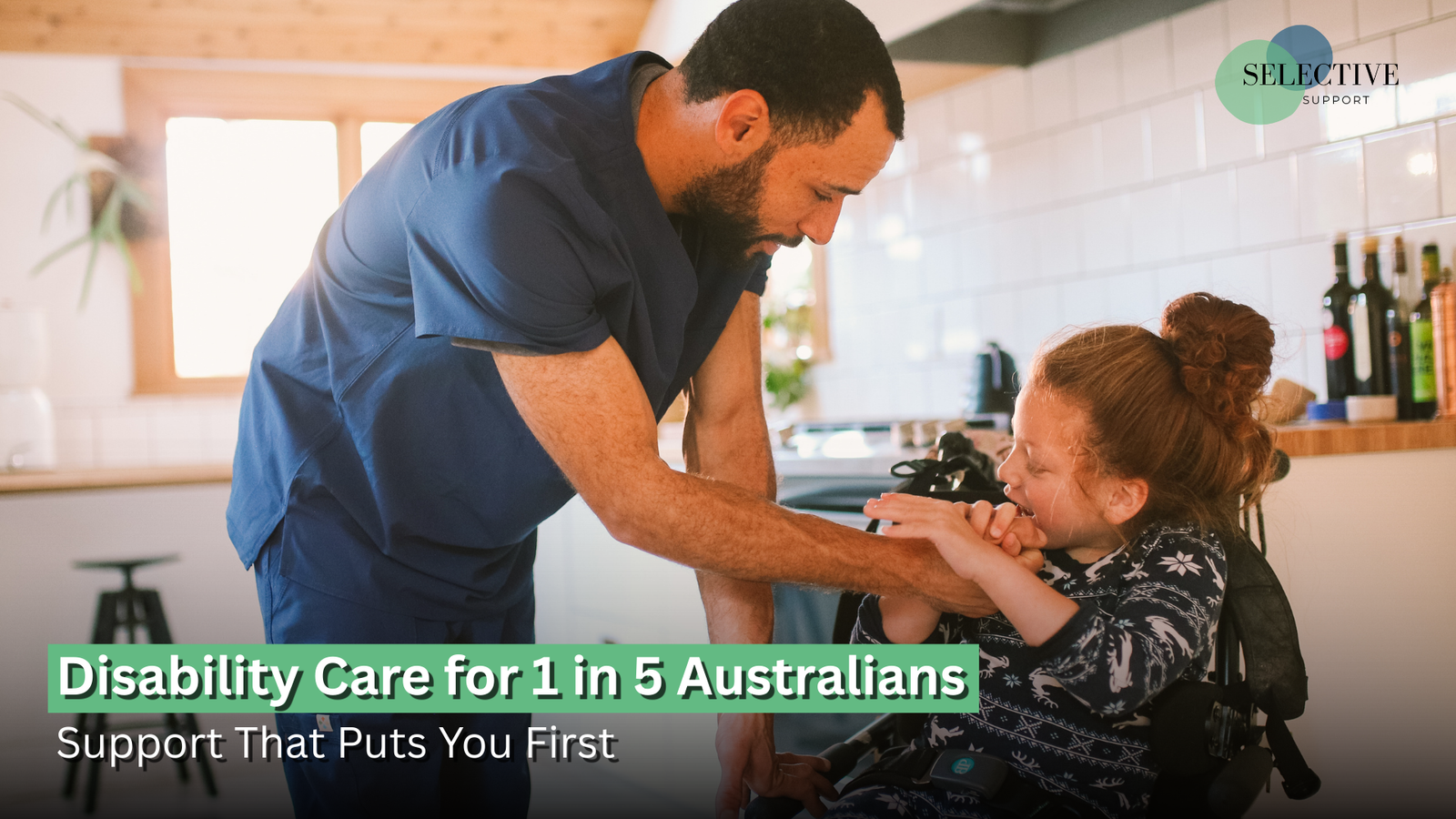Disability Care in Australia – Where to Find Support
Have you ever felt overwhelmed trying to find the right support for yourself or someone you care for? With 1 in 5 Australians living with a disability, it’s clear that disability care touches millions of lives, yet the process of understanding plans, services, and options can feel confusing and exhausting. If you’re an NDIS participant or a carer, this blog will give you clarity: we’ll unpack the numbers, explain the NDIS list of disabilities, and show you where to turn for the right disability support service. Most importantly, you’ll discover practical steps and reassurance that the right disability assistance is within reach.
How Many People in Australia Have a Disability?
Right now, more than 5.5 million Australians, that’s over 1 in 5 people, live with disability, according to the Australian Bureau of Statistics. That number represents friends, family, neighbours, and colleagues, all with unique stories and needs. Disabilities can look very different from one person to another. Some are visible, others are not. Some affect daily routines, while others are more about emotional or social wellbeing.
The main types of disability include:
- Physical disabilities – conditions that affect mobility or physical function.
- Psychosocial disabilities – challenges linked to mental health conditions such as anxiety or schizophrenia.
- Intellectual disabilities – conditions that affect learning, reasoning, or decision-making.
- Sensory disabilities – such as hearing loss or vision impairment.
Why does this matter? Because disability care should never feel one-size-fits-all. The right support looks different depending on your circumstances, and it’s important to know that your needs are recognised.
What Disability Care Really Means for You
Beyond Numbers – Understanding Your Needs
Statistics can show how many people live with disability, but they don’t capture what life feels like day to day. For an NDIS participant with psychosocial disability, the biggest challenge might be managing the anxiety that comes with every appointment or phone call. For a full-time carer, it could be the endless paperwork, the long wait times, and the pressure of chasing providers while also caring for their loved one.
These experiences are deeply personal, and they highlight why disability assistance should always be tailored to the individual. It’s not just about filling service gaps or ticking boxes, it’s about truly understanding the person behind the plan.
When supports are shaped around your story, the difference is life-changing. A young participant may feel empowered when their NDIS plan includes community activities that bring routine and purpose. A carer may finally breathe easier when they have a responsive coordinator who explains things clearly and takes some of the load off their shoulders.
At Selective Support, we believe disability care is about listening first and acting second. By recognising the unique challenges you face, whether it’s building confidence, creating structure, or reducing stress, we can help you connect with the supports that matter most. Because beyond the numbers, your goals, your wellbeing, and your independence are what truly count.
Personalised Disability Support Service Options
That’s where thoughtful disability care makes the difference. Under the NDIS, you might access:
- Support Coordination – making sense of your plan and services.
- Psychosocial Recovery Coaching – building routines and strategies for mental health.
- Allied Health Services – such as OT, physio, or dietetics.
- In-home or community supports – to help with daily living and independence.
At Selective Support, we believe disability care is about walking alongside you, not just ticking boxes. We remember your story, respond quickly, and make sure you feel supported every step of the way.
The NDIS List of Disabilities – Where You Fit In
When you first hear about the NDIS list of disabilities, it can feel like a long, complicated document. In reality, it’s simply a guide that helps identify who may be eligible for support. The NDIS recognises a wide range of disabilities, physical, psychosocial, developmental, intellectual, and sensory, because every journey looks different.
Common Disabilities Supported by the NDIS
Some examples include:
- Autism spectrum disorder
- Schizophrenia and other psychosocial conditions
- Cerebral palsy and neurological conditions
- Intellectual disability
- Hearing or vision impairment
This list shows the breadth of support available, but it’s not the full picture.
Why the NDIS List of Disabilities Isn’t the Whole Story
Even if your exact condition doesn’t appear on the list, you may still qualify. What matters most is how your disability affects your daily life and independence. This is where having the right guidance matters. At Selective Support, we walk you through the details, help you gather the right evidence, and make sure you feel confident in how your story is represented to the NDIS.
“The NDIS list of disabilities isn’t meant to limit you, it’s a starting point. What truly matters is how your condition impacts your daily life and independence. With the right support and evidence, many people find they’re eligible for services even if their condition doesn’t appear word for word on the list.”
– Selective Support Team

Where You Can Find the Right Disability Assistance
Local Disability Support Services Near You
In South-East Melbourne, there are many disability support services available, from therapy providers to local community programs. The challenge isn’t so much finding services, but working out which ones will actually suit your needs, values, and goals.
For many NDIS participants and carers, this is where the stress begins:
- Services can sound the same on paper, but the quality of support can vary.
- Larger organisations may not always provide the personal touch or continuity you’re looking for.
- Understanding how each service fits within your plan and budget can feel overwhelming.
This is why choosing the right guidance matters. A good support coordinator can save you hours of confusion by helping you compare services, explaining how they link back to your plan, and checking in to make sure they’re delivering what you expected. At Selective Support, we go further, we listen to your story first, then connect you with providers who align with what you actually want from your NDIS journey.
If you’re in South-East Melbourne and looking for disability assistance that truly puts your needs first, book a free discovery call with Selective Support today. Together, we’ll make sure the services you choose work for you, not the other way around.
Why Choosing the Right Disability Care Provider Matters
Large providers often mean repeated handovers, slow responses, and feeling like just another number. With Selective Support, you’ll always have a dedicated coordinator who knows your story, responds within 24 hours, and makes sure your plan works for you.
Taking the Next Step in Your Disability Care Journey
With 1 in 5 Australians living with a disability, it’s clear that support matters now more than ever. The NDIS list of disabilities shows just how many different needs are recognised, but what truly makes the difference is having the right disability support service by your side. When you choose personalised disability assistance, you’re not just managing a plan, you’re building confidence, independence, and peace of mind.
You don’t have to face the NDIS maze on your own. With Selective Support, you’ll have a dedicated coordinator who listens, responds quickly, and walks with you every step of the way.
Reach out to Selective Support today, compassionate care, clear guidance, and support that remembers your story.
Disability Care FAQs: Your Questions Answered Simply
1. What Is a Disability Care Plan?
A disability care plan is a personalised roadmap that outlines the supports, services, and goals that matter most to you. It helps make sense of your NDIS funding and ensures you have the right mix of therapies, daily living supports, and community connections.
2. What Do Disability Services Do?
Disability services provide the practical and emotional support you need to live with confidence and independence. This can include help at home, therapy services, mental health coaching, or connecting you to community programs. The goal is simple: to reduce stress, build skills, and make sure you feel supported in the areas of life that matter most to you.
3. How Much Is Disability Care?
The cost of disability care depends on the type of supports you need and is usually covered by your NDIS plan. Rather than paying out of pocket, your funding is allocated to services like support coordination, allied health, or community participation.


